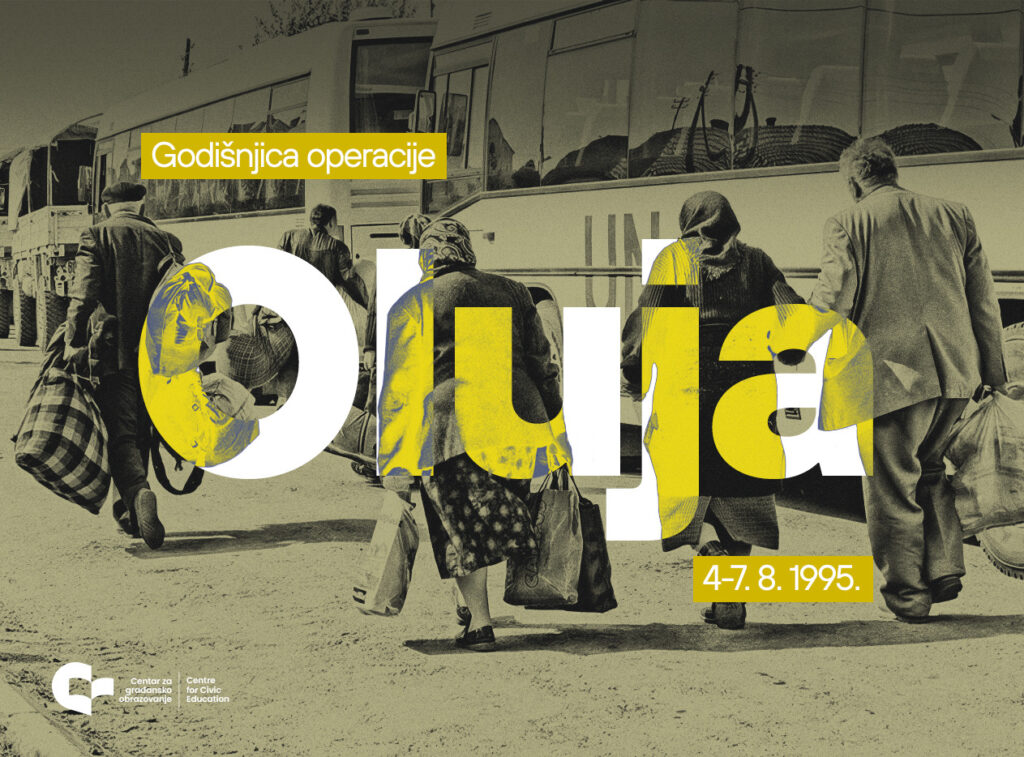Centre for Civic Education (CCE) honours the innocent victims of crimes committed during the military-police operation “Storm,” which was conducted from 4 to 7 August 1995, and once again emphasizes the importance and obligation of uncovering the truth about the missing, prosecuting war crimes, and delivering justice for the victims as a permanent duty of all governments in the region.
During this operation, Croatian forces committed systematic crimes against the Serbian civilian population and their property, resulting in the expulsion of around 250,000 Serbs, widespread destruction and looting of their property, and subsequent prevention of their return. Data from the Croatian Helsinki Committee for Human Rights from 2001 indicates that 677 civilians were killed during and immediately after operation “Storm.” The records of D.I.C. “Veritas” contain the names of 1,893 Croatian citizens of Serbian nationality who were killed or went missing during operation “Storm,” including 1,236 civilians. Unfortunately, even after 29 years, justice has not been served in this case, as the majority of these crimes have not been prosecuted and the perpetrators have not been punished.
In 2008, the International Criminal Tribunal for the former Yugoslavia (ICTY) indicted Ante Gotovina, commander of the Split Military District of the Croatian Army and chief operational commander of operation “Storm” in the southern part of the Krajina region, then Ivan Čermak, commander of the Knin Garrison, and Mladen Markač, commander of the Special Police of the Ministry of the Interior of the Republic of Croatia, for crimes against the Serbian population during “Storm.” In the first-instance verdict in 2011, Gotovina and Markač were sentenced to 24 and 18 years in prison for war crimes and crimes against humanity, while Čermak was acquitted. However, following an appeal the following year, Gotovina and Markač were acquitted of criminal responsibility. This verdict caused considerable controversy as the Trial and Appeals Chambers of the ICTY – based on the same facts and law – reached diametrically opposed conclusions on key issues contested by the prosecution and defense during the trial. It is important to emphasize that these conclusions do not question the established facts about what happened during and after operation “Storm.”
Some of these facts are available on the RECOM Reconciliation Network website, through excerpts from ICTY and Croatian court verdicts, victim testimonies before the ICTY and from RECOM forums on transitional justice in post-Yugoslav countries, the Humanitarian Law Center’s report “Bombing of Refugee Columns during ‘Storm’ – August 1995,” the digital narrative “Forced Mobilization of Refugees,” and the interactive narrative by the Sense Transitional Justice Center and the Serbian National Council in Croatia “Storm in The Hague.”
The victims of “Storm” remain without justice whether they live in Croatia, Serbia, or Montenegro today. In Serbia, where the majority fled, civilian invalids and families of “Storm” victims lack financial, health, and psychosocial support from institutions, despite their tragedy being officially commemorated and misused in this country.
The CCE urges the competent authorities of the countries in the region to ensure that the memory of this crime is based on facts and to do everything in their power to achieve justice.
Damir Suljević, Programme Associate

